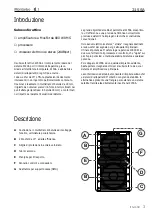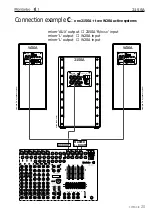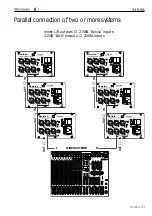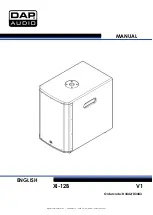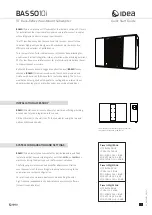
215 SA
Example
A
(page 18)
:
One 215SA + two W20A active systems
The complex connections usually required for this configu-
ration with other systems are made extremely simple with
our 215SA thanks to the L/R outputs of the built-in stereo
electronic cross-over.
Note
: It is advisable to place the subwoofer in the center,
between the two speaker enclosures.
mixer L/R outputs
➟
215SA L/R inputs
215SA L/R outputs
➟
inputs of the two W20A
☛
See connection example
A
on page
18
• Always use shielded cables
• Connect the L-R outputs of the mixer to the L-R inputs of
the 215SA.
• Connect the L-R outputs of the 215SA to the inputs of
the 2 active systems. This set-up allows them to benefit from
the increase in dynamic range provided by the electronic
crossover of the 215SA.
• Make sure the cross-over button (1) is pushed
• The subwoofer's level control adjusts also the speaker
system’s level. First set the speaker system's volume controls
to their maximum position, then adjust them to obtain the
required tonal balance.
Connection examples
The very low frequency range reproduced by the subwoofer
model 215SA (37
÷
100 Hz) is essentially omnidirectional
allowing easy installation of the enclosure.
In most cases the subwoofer can be placed near to the loud-
speaker system, but when space or set up reason dictate it,
the subwoofer can be positioned at some distance from the
speaker system (e.g.: under the stage floor).
You must always consider that the extended low frequency
range increases the risk of acoustic feedback, with
undesired "howls" and reduced clarity. It is thus essential
to place the subwoofer on a rigid structure, that does not
transmit vibrations to the microphones.
Some connection examples, among the most common
possible configurations, are described here below and also
illustrated on pages
18
,
19
and
20
of this manual.
Our examples are showing the 215SA subwoofer enclosure
in conjunction with the Montarbo powered speakers W20A
used as "satellite" enclosures.
However this represents an optimum combination, the
215SA can be added with excellent results to any speaker
system.
Example
B
(page 19)
:
Two 215SA + two W20A active systems
This is the most typical configuration: each subwoofer can
drive one or two self-powered speaker enclosures.
mixer 'L/R' outputs
➟
'R
/
MONO
' inputs of two 215SA
215SA 'R' outputs
➟
inputs of the two W20A
☛
See connection example
B
on page
19
• Always use shielded cables
• Connect the L - R outputs of the mixer to the 'R/
MONO
'
inputs of the two 215SA subwoofers.
• Connect the 'R' outputs of the two 215SA to the inputs
of the two active systems.
• Make sure the cross-over button (1) is pushed on each
215 SA
• The subwoofers level controls adjust also the speaker
system’s volumes. First set the speaker system's volume
controls to their maximum position, then eventually adjust
them to obtain the desired tonal balance.
Example
C
(page 20)
:
One 215SA + two W20A active systems
This is a more complex configuration which enables selective
enhancement of the low-frequencies (for example, only on
drums and keyboards, not on voices or brasses).
Note
: It is advisable to place the subwoofer in the center,
between the two speaker systems.
mixer 'AUX' output
➟
215SA 'R
/
MONO
' input
mixer 'L' output
➟
W20A input
mixer 'R' output
➟
W20A input
☛
See connection example
C
on page
20
• Always use shielded cables
• Connect the AUXILIARY output of the mixer to the
'R/mono' input of the 215SA.
• Connect the L and R outputs of the mixer to the two
speaker systems respectively.
• This type of set-up allows to use the subwoofer to extend
the low frequency response of only those instruments that
really need it (e.g. drum machines, bass, keyboards). These
instruments are selected by means of the AUX send controls
on the corresponding channels. The subwoofer's volume
control and the mixer's AUX output level control adjust only
the very low frequencies.
11
ENGLISH
Содержание 215 SA
Страница 1: ...215SA active subwoofer...
Страница 16: ...215 SA Block diagram 16 APPENDIX...



